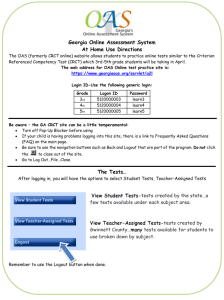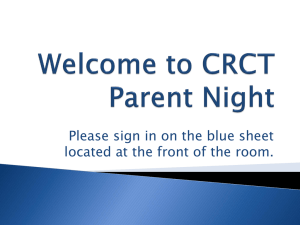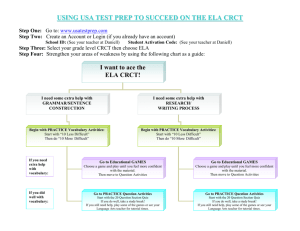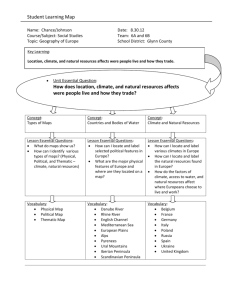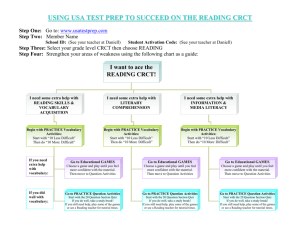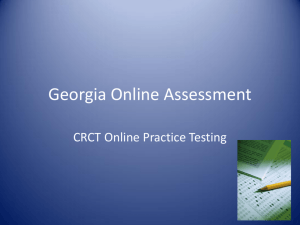Lyerly Elementary School
advertisement
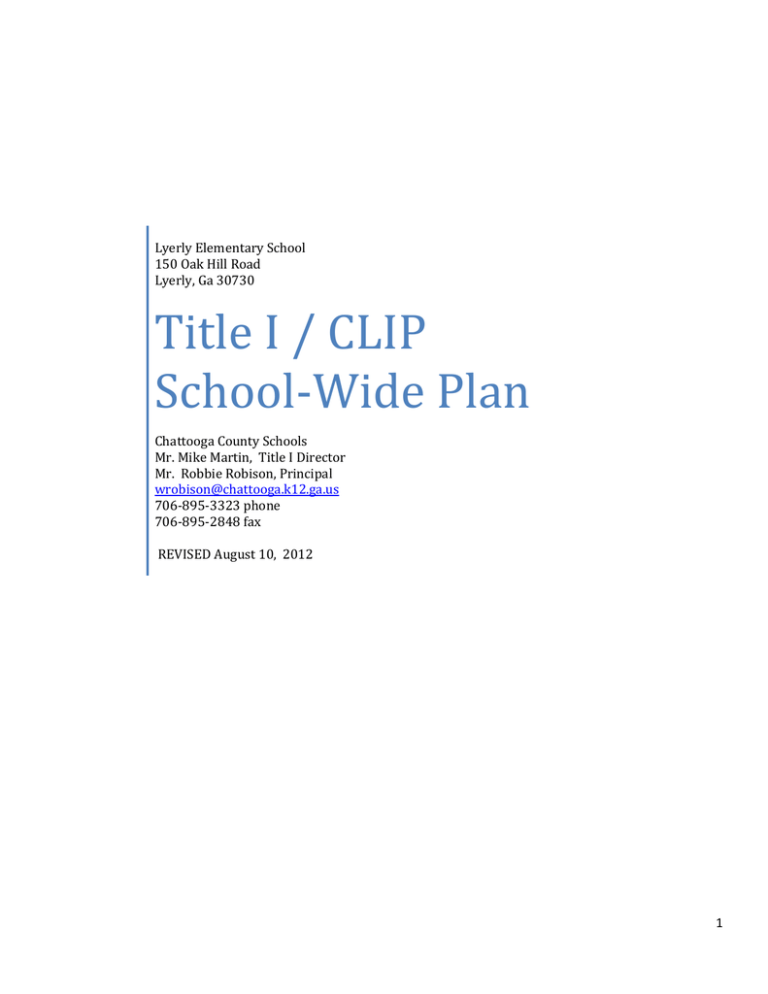
Lyerly Elementary School 150 Oak Hill Road Lyerly, Ga 30730 Title I / CLIP School-Wide Plan Chattooga County Schools Mr. Mike Martin, Title I Director Mr. Robbie Robison, Principal wrobison@chattooga.k12.ga.us 706-895-3323 phone 706-895-2848 fax REVISED August 10, 2012 1 Table of Contents 1. 2. 3. 4. 5. 6. Develop a Comprehensive Needs Assessment Develop school-wide reform strategies Provide instruction by highly-qualified teachers Provide high-quality and ongoing professional development Strategies to increase parent involvement Devise a plan for assisting preschool and eighth-graders in transition 7. Teacher involvement in use of academic decisions 8. Coordinate and integrate federal, state, and local services and programs 9. Provide timely assistance to struggling students 10. Communicate assessment results to parents 11. Collection and disaggregation data 12. Provisions for statistically sound test results 13. Report test data publicly 14. Development of school-wide plan 15. School and community involvement in school-wide plan 16. Plan availability 17. Translation of Title I Plan 18. Section 1116 Provisions Page 3 Page 6 Page 7 Page 8 Page 10 Page 11 Page 12 Page 12 Page 14 Page 16 Page 16 Page 16 Page 17 Page 17 Page 17 Page 17 Page 17 Page 17 Appendices Appendix A (2010 CRCT Data) Page 19 Appendix B (Parent Involvement Policy) Page 20 Appendix C (Parent Compact) Page 23 Appendix D (Parent Survey Results) Page 24 2 1. Conduct a comprehensive needs assessment A school-wide plan has been developed with the help and participation of the following persons: Robbie Robison, Principal Shirley Marbut, Media Specialist Tracey Reynolds, Parent Coordinator Missy Lanier, Academic Coach Karen Tribble, Leadership Team, teacher Patti Luther, Leadership Team, teacher Lindsay Eckroat, Leadership Team, teacher Lisa Bullard, Leadership Team, teacher Denise Jones, Leadership Team, teacher Jessica Cook, Leadership Team, teacher Rozzie Starr, teacher Wanda Bain, Leadership Team, teacher Rebecca Thomas, Parent Tracy Dotson, Parent Mrs. Mitchell, Parent Sherry Wallin, Paraprofessional, parent Mike Martin, District Title I Director Information and data were obtained from the following sources: Staff Needs Assessment Survey Teacher Survey Student Survey Parent Survey Community Survey CRCT scores GKIDS results Local assessments such as STEEP, STAR, benchmark and DRA tests Although the plan is based on the needs of all students in the school, we have focused on and identified students and groups of students who are not meeting state academic standards including: Students with disabilities… We are focusing on helping more students with disabilities meet state standards in math and reading. Middle school students tutor elementary students during the school day as we work to support and grow our learning community at LES. We provide additional and skill- specific tutoring and extra practice with computer software during many classes. 3 Struggling students also benefit from the pyramid of interventions (RTI), supplemental resource classes, and the addition of extended learning time built into the schedule. Regular education students…. We are using test results to identify regular education students who are in danger of not meeting standards in both reading and math (Appendix A). Students who did not meet standards last year are receiving specific skills instruction through RTI and Extended Learning Time (ELT). We have also identified students who may move from the “meets” to “exceeds” categories and are accelerating them during ELT with additional instructional computer software and advanced instruction. We are using current and longitudinal data to help the school identify and understand areas that need to be addressed both in teaching and student learning. School improvement data is being used to determine areas of concern. For example, we are addressing students’ weak math skills by providing research-based best practices to teach CCGPS during Extended Learning blocks. Local and state test data help identify specific areas needing improvement. After reviewing scores, we are targeting instruction for students with disabilities in math, reading and language arts. The major strengths we found in our program were…. We are doing well in reading scores overall. Additional ELT time is offered to work on reading skills. We are instituting a more rigorous math curriculum based of the CCGPS math frameworks. We have also extended the class time for math instruction each day. Students with disabilities are being served with a special emphasis on academic areas of math and reading. For many students, ELT is spent with the special education teachers in a resource room to further meet instructional needs. They also receive services through co-taught classes in all areas. Tutoring is offered after school for some students through the McKinney-Vento Grant. The major needs we discovered were….. A focus on standards-based instruction to align with the CCGPS is needed. Lessons should include rubrics, graphic organizers, teacher commentary, journaling and differentiation when needed. Classroom instruction and assessments need to be more closely aligned with the standards, which have 4 changed. Further staff development to support the school improvement plan is needed. Teachers and paraprofessionals need further staff development in the use of RTI, focusing on specialized interventions. All teachers need to be using the workshop model for instruction. This includes an opening lesson on a specific grade-level, content standard, work time for students to apply the standard, and a closing for sharing and summarizing what was learned. This model helps teachers and students understand what is expected for work and performance each day. Classroom routines and rituals help provide a safe and predictable environment for learning that makes productive use of class time. The school-wide program will address the specific academic needs of identified students in these ways…. The new state curriculum has created gaps in math skills as the standards have changed. Interventions and new strategies have been put in place in all grade levels. Timed math drills are being conducted to improve mathematical fact fluency. Students who are below grade-level will receive specific reading interventions. Differentiated lessons are being used to emphasize more hands-on activities. We feel that the following are root causes of some of our identified weaknesses: Academic interventions were not started early enough to prevent large skill gaps for some students. State math curriculum changes have left gaps in students’ math understanding. This may be a result of the standards not being rolled out from the earliest grades forward. Manipulatives and kinesthetic learning activities were not introduced early enough to make a difference for some children. Phonics instruction was lacking for some children. High rates of transience have hurt some students. The measurable goals to address these needs are in the appendices and are aligned with the Georgia Department of Education directions for measurable annual objectives for continuous and substantial progress by each group of students enrolled in the school. Measurable Goals: 2012-2013: A minimum of 91% of students in grades 3-8 will meet and/or exceed standards in reading on the Georgia CRCT. A minimum of 80% of students in grades 3-8 will meet and/or exceed standards in mathematics on the Georgia CRCT. 5 A minimum of 89% of students in grades 3-8 will meet and/or exceed standards in language arts on the Georgia CRCT. A minimum of 79% of 3rd-8th grade special education students will meet and/or exceed standards in reading. A minimum of 72% of 3rd-8th grade special education students will meet and/or exceed standards in language arts. A minimum of 62% of 3rd-8th grade special education students will meet and/or exceed standards in mathematics. 2) School-wide reform strategies and instructional methods Lyerly School implements scientifically-based reform strategies that are effective in raising student achievement throughout the school. We address the needs of all children in the school. A strong focus remains on students who are not demonstrating grade-level proficiency related to the state’s academic content standards. The strategies are as follows: Workshop Method training and follow up for all teachers. Use of Georgia Online Assessment for student practice and teacher assessments. Training in Response to Intervention for all teachers. Professional development on standards-based instruction and increasing the use of: common assessment, student commentary, rigorous questioning, and grading rubrics, as well as the use of benchmarks for progress monitoring. Use of Developmental Reading Assessment (DRA) and STAR to determine reading levels. Use of Study Island and Classworks computer tutorials in math, reading, language arts, fine arts and technology. Utilize writing tasks across the curriculum. All students will participate in the 25 book campaign. An agriculture class for our eighth grade. It meets each day with a certified agriculture instructor. Use of system-developed benchmarks STEEP testing for math and reading fluency in grades 1-5 6 Continued use of computer software, games, CCGPS framework tasks and manipulatives to provide differentiated instruction. Continue small-group instruction interventions in math, reading and writing in Extended Learning time (ELT). Use of smartboards and other technologies in the classroom. We will increase the amount of quality learning time by…. Altering the daily schedule for elementary students to allow for 90 minutes of extended learning time (ELT) with 45 minutes in the mornings for math and a similar block in the afternoon for reading. Middle school students have one 45 minute block in the afternoons to extend their learning time. We will offer after school tutoring in conjunction with the McKinney-Vento grant. Math and reading websites will be posted in the school and on websites to offer students extra opportunities to practice. Students will be provided login and passwords to Online Assessment System (OAS) and Study Island for use through home internet connections. Timed tests will be used to increase math fluency (STEEP). We now use Renaissance Place for the online version of Accelerated Reader (AR). Lyerly School’s School Improvement plan targets populations that include all students in grades K-8 in reading and math. A special emphasis is put on children with disabilities. CRCT data, benchmark testing, writing test, pre- and post-unit tests, student portfolios and parent surveys all help determine if the needs of the targeted population have been met, and are consistent with our school improvement plan. Establishing measurable goals to meet academic standards, measuring and monitoring student progress, and providing support in the targeted areas of mathematics and reading are consistent with the Educate America Act. 3) Instruction by highly-qualified professional staff We will provide instruction by highly-qualified teachers who meet the standards established by the State of Georgia Professional Standards Commission. Currently 100% of Lyerly School’s teachers and paraprofessionals are listed as highly qualified to teach in their assigned areas. 7 All classes are taught by teachers certified for the subject and grade level they are assigned to. The percentage of teachers with a Master’s degree or higher is 80%. There is one National Board certified teacher on staff. The average years of experience for the staff is 17 years. All paraprofessionals have passed the state exam. Strategies used to attract highly-qualified teachers: Focus on the following characteristics of effective teachers when interviewing prospective candidates: o Extensive knowledge of content o Knowledge of best practices in instruction o Knowledge of the learning process o Understanding of data-driven decision-making practices in the classroom o Respect of students o High expectations o Passion for teaching and learning o Ethical and moral commitment o Results Provide ongoing staff development in areas of need. Provide adequate teaching resources and support. Strengthen relationships with local and regional teacher preparation programs. County-sponsored gifted, reading, and English as a second language endorsements. 4) High-quality and ongoing professional development Principals, teachers, paraprofessionals, and other staff participate in and redeliver staff development that addresses the root causes of our identified needs. Working with the entire faculty, the Lyerly School Leadership Team identifies specific needs for school improvement in the areas of math, reading, and 8 language arts. This year we have also looked at instructional gaps in science. The school improvement plan is modified each year to reach these goals. Teachers are continually trained in best practices and will be evaluated using Georgia Teacher Observation Instrument. Teachers undergo training for the Student Support process and intervention strategies in order to implement Response to Intervention in the classroom for struggling learners. Teachers are trained off-site and redeliver to the rest of the faculty when necessary to keep abreast of research based methods and strategies. Some examples of these staff-led redeliveries include: “Writing to Win,” Ethics in Testing, “Thinking Maps,” (GYSTC) classes, and the Georgia Math Academy, among others. We have aligned professional development with the state’s academic content standards. Teachers are required to plan collaboratively within grade levels and within content areas when possible. Teachers are encouraged to collaborate with grades above and below them through regular vertical planning sessions. Teachers are trained in the Georgia Common Core Standards and lesson plans are developed that reflect these standards. We have devoted sufficient resources to carry out effective professional development activities that address the root causes of academic problems. Throughout the school, the workshop method is the primary instructional model across grade levels. Co-teaching in the classroom is a focus. Several classroom teachers are attending a co-teaching academy with the special education teachers. This team-building and training enhances instruction for all students in these classrooms. Response to Intervention is another focus. Many teachers are still learning about the process. Staff development time is often devoted to this. Teachers have been included in professional development activities in the areas of formative and summative academic assessment. This enables them to collect information to improve the academic understanding and performance of individuals and adjust instruction in the following ways: Teachers have been trained in reading various score reports and explaining them to students and parents. 9 Teachers have also been trained to disaggregate data for classes, looking for patterns in strengths and weaknesses among groups and individual students. 5. Strategies to increase parental involvement We involve parents in planning, review, revising and improving the comprehensive school wide program by: Inviting parents to participate in writing the needs assessment surveys, and the plan itself. Asking the school council, which is primarily made up of parents, to review and make suggestions to the school wide plan We have developed a parental involvement policy (Appendix C) that includes strategies to increase parental involvement and describes how the school will provide individual students’ academic assessment results to parents. The following are ways we involve parents: We have a family math night that provides parents an opportunity to learn and play math games that will assist their children in learning the grade-level standards in a fun and motivating way. “Bags of Games” are available for parents to take home and continue to build those math skills through game playing. Parents are invited to open discussions during PTO and Open House events. A CRCT Math Night is held to let parents practice sample Common Core items and to inform them about using the Infinite Campus Parent Portal. Classroom newsletters are sent home with students. Invitations to events are posted on the school web page and those of individual teachers. A parent resource area is available where parents can check out items to use with their children. The Parent Portal function of the system web page allows parents to check on their child’s academic progress, attendance and upcoming assignments. LES has an active Parent Teacher Organization. 10 Agendas are used in the classrooms at all grade-levels to ensure regular parent-teacher communication on daily activities, assignments and test grades. There is a part-time Parent Coordinator funded through Title I. A needs assessment is conducted each year to access targets for parental involvement activities. 6) Assisting preschool children in the transition from early childhood program and middle school transition to high school Preschool and Kindergarten Lyerly School offers a Pre-k program for up to twenty- two, 4 year olds per year. This classroom is in the main part of our school building. This makes the transition easier for them because they are already comfortable in the surroundings and with school routines. These students are introduced to the kindergarten teachers several times during the year. They visit in the kindergarten classrooms to watch a part of the day. Other students entering kindergarten are able to meet the teachers during pre-entrance placement testing and at Open House the night before school starts. The parent coordinator is introduced to the students at this time and visits the classrooms often during the first weeks of school. Additional support is provided through kindergarten paraprofessionals. All school paraprofessionals are required to have 50 hours of professional development training and have successfully passed the state exam to become highly qualified. 8th to 9th Grade Transition The transition from eighth to ninth grade is a big step for students. Some of these students have been in the same school for their entire education career. Planning ahead for the transition makes it easier on the students. The transition plan will include: In February, the students will take a field trip to the Chattooga High School. They will take part in the following activities while there: (a) The principal will welcome them to the high school (b) A campus tour will include hallways, the lunchroom, gym, and any classrooms where elective and vocational classes are held (c) Vocational teachers and those who teach freshman elective classes will describe what they have to offer 11 (d) A content area teacher will explain what the freshman academic year will be like In March, students who are active in academics, sports, electives, clubs, etc. will visit for a question and answer session from a student’s point of view. Some ninth grade teachers will accompany them, so the students can match a face with a name in the fall. Also in March, the high school counselor will visit the school and talk about registering for classes. Paperwork for registration will be distributed and explained. Students will be assisted in the use of Infinite Campus to register for classes. 7) Teacher involvement in use of academic assessment decisions Teachers are included in decisions regarding use of academic assessment by: Using classroom data for progress monitoring Using the system level benchmarks to determine areas of strengths and weaknesses to see which skills have been mastered and which ones need to be re-taught Using data to target at-risk students in the areas of reading and math for Response to Intevention The academic coach rendering assistance in the analysis of data. There are teacher teams that have been assigned specific tasks. They include: The Leadership Team: This team is charged with looking at specific data to make decisions about instruction. The team is made up of school leaders and teachers. They develop an action plan for school improvement. Design Team: This team is made up of elementary, special education, and middle school teacher representatives, the academic coach, Media Specialist, and administrator. They are charged with finding the roots of problems and academic weaknesses. Student Support Team: A coordinator, classroom teachers, resource teacher, counselor, and administrative representative utilize test data to identify areas of needed growth for students with academic weaknesses. They work towards helping meet RTI goals. 8) Coordinate and integrate Federal, State, and Local services and programs County level administration coordinates the local and federal supplemental programs. 12 The Chattooga County School System and each individual school site has a heightened awareness of the opportunity provided by their designation as a Title I Schoolwide Project. With this designation ,we are able to blend federal, state, and local funds to maximize services to students and families and provide for greater achievement in targeting specific goals for school improvement. We are able to promote greater student achievement, maintain a highly qualified staff, and provide tools and resources for instruction. Decisions are based on scientifically- based instructional strategies and methods of instruction. School improvement plans and professional development funds are used to support these scientifically- based methods. All federal Title grants, state allocations for personnel and materials, transportation and operations, as well as locally alloted dollars are used consistently with their intended purposes in supporting high levels of expectations for a quality Chattooga County educational experience. Following is a list of Federal, State, and Local services and programs with an explanation of how we are coordinating and integrating those services and programs…. Title I Enrichment classes: Teachers will work collaboratively with the RTI coordinator to target and address the needs of students at risk of not meeting the math and reading standards. Classes for students who have struggled to meet standards in previous years are given additional support and instruction during daily Extended Learning Time (ELT). Designate school Title I funds to improve student achievement by: (a) Proposing to fund one academic coach and one teacher to enhance student performance (b) Using Title I funds to purchase the Internet -based Study Island computer program. The package includes math, reading, language arts, science, social studies, fine arts, and technology components. These are accessible from any Internet connected computer with logins and passwords. (c) Creating parental involvement which has been enhanced by offering programs such as reading picnics, Thanksgiving and Christmas lunches with parents, Grandparents’ breakfast, and CRCT Math Night (d) Using Title I funds to assist with funding teacher training in areas of reading and math improvement and standards- based classrooms Various sources of funding are used together in the school. After School Tutoring: Title I funds are used in conjunction with the McKinney-Vento Grant to support after school tutoring services. These services are provided in hopes of bringing students from a deficit to meeting standards. The combination of funds will help to provide school materials to students, and transportation on an as-needed, qualifying basis. 13 9) Timely additional assistance to students who experience difficulty Periodic analysis of school effectiveness will help improve student learning. Analyzing data provides for schedule adjustments to place students in the best learning environments. Yearly progress is monitored through CRCT scores, benchmark scores, unit pre and post tests, and Annual Yearly Progress reports. Twice a year, students take reading, writing, and math benchmark tests based on retired OAS prompts. Data from these measurements are reported and analyzed by educators at the county office and the school. The staff participates in periodic grade level meetings where best practices are discussed and research is used to make decisions about curriculum and instruction. Teachers review students’ permanent records, Student Support Team (SST) records, previous test results, and other data to determine students strengths and weaknesses. Teachers compile class and individual profiles to determine class profiles and address strengths and weaknesses. We are providing activities to ensure that students who experience difficulty mastering proficient or advanced levels of academic achievement shall be provided with effective, timely, and additional assistance. These strategies/activities include: Extended Learning Time (math and reading) each day Response to Intervention with tiered level interventions Student Support Team Tutoring before and after school as funds allow Teachers observe other teachers who use activities successfully Centers, games, and manipulatives to motivate and assist in weak areas Rewards for achievement (Accelerated Reader, Study Island blue ribbons, attendance, behavior, Academic Honor Roll) Classworks, Study Island, and OAS tutorials Writing to Win student journaling Motivational speakers and programs Monitoring the success of each program is based on weekly and monthly reports provided by teachers, tutors, the Media Specialist, and computer databases. Cooperation 14 with Northwest Georgia RESA provides training to all faculty members in standardsbased instruction, authentic assessments, and other best practices. Teachers are continually trained in best practices and will be evaluated using Class Keys. Teachers undergo training over the Student Support process and intervention strategies in order to improve teacher Response to Intervention (RTI). Teachers are trained off-site and then redeliver data to the faculty when necessary to keep abreast of research-based data and strategies. Some example of teachers attending workshops and redelivering to the faculty are: “Writing to Win” “Ethics in Testing” GYSTC classes Math Academy Elluminate sessions in content areas and the Georgia Performance Standards Frameworks Thinking Maps We have aligned professional development with the state’s academic content standards… Teachers are required to plan collaboratively within grade levels and within content areas when possible. Teachers are encouraged to collaborate with grade level teachers above and below them. Teachers are trained in the Common Core Georgia Performance Standards, and lesson plans are developed that reflect these standards. We have devoted sufficient resources to carry out effective professional development activities that address the root of academic problems. Parent contact is mandatory at Lyerly School . Teachers must contact all parents of their students within the first six weeks of school. Conferences are encouraged to discuss student progress according to progress reports, report cards, benchmark gains, and CRCT strengths and weaknesses. Student behavior may also be discussed at these conferences through meetings, notes home, and /or email. Parent support may include the following: Classroom newsletters with skill practice suggestion 15 Links to practice websites on teacher web pages Reading and math games that may be checked out from the PAL Center Parent workshops Community and state funded programs such as McKinny-Vento, GED classes, and Even Start Infinite Campus Parent Portal access to grades and assignments Student agendas Teacher e-mails via the school web site Phone conferences Student Support Team meetings are held to discuss strategies and procedures to encourage student success. Parents are notified by letter and encouraged to attend and participate in these meetings. The meetings are attended by a committee of the student’s present, past, and resource teacher. This is the first step towards RTI referrals. 10) Communication of Assessment Results to parents Parents are encouraged to maintain contact with their child’s teachers regarding results of state-mandated assessments. Parents are informed of their child’s performance through conferences, agendas, progress reports, report cards, e-mails, calls, or notes home. Results reflected in the AYP Report and School Report Card are shared at a ParentTeacher Organization (PTO) meeting in October. The web URL address is provided for parents to review data regarding the school’s AYP status, and academic achievements are made available on the school’s website. 11) Collection and Disaggregation of Data Test data is collected according to state guidelines by the system Testing Director and Assistant Superintendent. The State Department of Education will dissagregate the data and provide information to the system and schools. This data will be provided to the media through the central office. At the school level, the principal, Media Specialist, academic coach, and teachers disaggregate national, state, system, and school data to develop student profiles that help ensure that the needs of individual students are met. Examples of data used include: CRCT scores, STAR, Developmental Reading Assessment (DRA), 3rd, 5th, and 8th grade StateWriting Test results, Benchmarks (reading and math), computer programs, reports from OAS, Study Island, and Classworks. The data is disaggregated by gender, ethnicity, free and reduced lunch, and students with disabilities. 12) Provisions for Statistically Sound Test Results The state mandated assessments meet reliability and validity requirements, therefore, being statistically sound. Reading and math benchmarks were developed countywide using questions from the Georgia On-line Assessment System. 16 13) Public Reporting of Disaggregated Data The disaggregated data shall be reported to the public in accordance with state guidelines. The State Report Card and local system reports shall be disseminated to the media at the state and system levels. Lyerly School holds a parent meeting to discuss schoolwide disaggregated data. Data reflected in the AYP report and School Report Card are shared at a PTO meeting and at Open House. 14) Development of schoolwide plan over a one year period Lyerly School’s Title I Schoolwide Plan was developed during the 2009-2010 school year and will be implemented during the 2010-2011 school year. Changes and additions were made in August 2010 to reflect 2010 CRCT scores and ammended goals. 15) School and Community Involvement in Schoolwide Plan The school Leadership Team, parents, and grade level teachers meet to assist in the development of the schoolwide plan. The plan is then presented to the School Council and PTO for community feedback. After incorporating suggestions and ideas from these groups, the completed plan is presented to the faculty and staff for approval. 16) Plan Availability A hard copy of the plan will be filed in the school office and Media Center. Parents will be notified through the school website and teacher newsletters that they may access the plan at any time during the school day. A hard copy of the planwill also be provided to the Title I Curriculum Director. 17) Translation of the Title I Plan At this time, we are not serving any non-English speaking students. If a need for a translation arises, it will be furnished by Central Office personnel. 18) Section 1116 Provisions This plan is subject to the school improvement provisions of Section 1116 of the No Child Left Behind Act. Lyerly School is currently making Adequate Yearly Progress and has never been on a needs improvement list. Summary and Evaluation The schoolwide program will be evaluated annually through state and local testing. The school’s Leadership Team will meet as needed to monitor progress in the implementation of the program and to assess the effectiveness of the schoolwide plan. In addition, the Leadership Team will evaluate and modify the School Improvement Plan as needed on an annual basis. The following methods will be utilized in the evaluation of the schoolwide plan: 17 Records for attendance for professional learning activities Analysis of annual reading and math CRCT results , including sub-populations Analysis of annual norm-referenced tests results in reading, writing, and math Analysis of reading and math benchmarks Review of school assessments such as Accelerated Reader and STAR results Media Center circulation records Review of daily schedules and lesson plans Review of student writing portfolios to determine writing achievement Results of 3rd, 5th, and 8th grade State Writing Tests 18 Appendix A Math GRADE LEVEL DNM Meets Exceeds 1 DID NOT TEST 2 DID NOT TEST 3 4 5 6 7 8 19% 39% 16% 34% 13% 5% 35% 43% 72% 51% 54% 67% 47% 17% 12% 15% 33% 28% Grade Level DNM Meets Exceeds 1 DID NOT TEST 2 DID NOT TEST 3 4 5 6 7 8 2% 17% 16% 7% 6% 0% 40% 48% 66% 54% 79% 56% 58% 37% 18% 39% 15% 44% Lang. Arts Grade Level DNM Meets 1 DID NOT 2 DID NOT 3 4 5 6 7 8 2% 22% 12% 20% 10% 2% 53% 48% 70% 59% 52% 44% Exceeds TEST TEST 44% 30% 18% 22% 38% 53% Reading 19 Appendix B Lyerly Elementary School Parent Involvement Policy August 2, 2012 The following parent involvement policy was developed and agreed upon by the staff and parents of students at Lyerly Elementary School. This policy will be distributed to and discussed with parents during an annual Meet the Teacher orientation. A copy will also be sent home to each family. Parent’s perceptions will be improved by using more effective communication plans. Parental input will be sought to strengthen the school-home partnership. The Common Core Standards, school curriculum, state and local assessments, school mission and belief statements, and the school’s annual report card will be communicated to parents in a variety of flexible ways including but not limited to the following: A. Meet the Teacher Orientation B. AYP Meetings C. Open House D. PTO Meetings E. Scheduled conferences and early release day conferences F. Personal contact by phone or letter/ Shout Point Phone System G. Online Newsletter H. Student Compacts I. Online Infinite Campus J. Open Lunch Invitation K. Reading Picnic, Thanksgiving Lunch, and Christmas Lunch L. School Marquee M. Teacher Newsletters N. 8th Grade School Orientation for High School Opportunities will be provided for parents to share expertise, to be involved and share appropriate decision making through: A. Classroom visits B. Parent Volunteer Programs C. Site-based Council Meetings D. School Committees E. Student Program and Projects 20 F. Site-based Workshops (Math night/ Science night/ music night/ CRCT night) G. Parent Workshops H. Community/Family Reading night Effective parent involvement and support partnerships among the school, parents and community will be ensured by: A. Providing materials and training B. Developing appropriate roles for community organizations and businesses in parent involvement activities C. Providing Parent involvement activities through parent involvement coordinator D. Providing opportunities for parents to become involved in school/classroom activities E. Providing parent volunteer packets F. Providing parents the opportunioty to be involved in developing the parent volunteer policy G. Classroom Mom, Dad, and Grandparents The school will provide information and opportunities for parents with limited English proficiency or disabilities to participate in programs and workshops. PROVIDING INFORMATION Lyerly Elementary School will provide parents with timely information either by conferences, meetings, online resources, school marquee sign, progress reports, report cards, and workshops concerning: A. Title I programs B. Individaul student asssessment results and their interpretation C. A discription and explaination of the school curriculum, academic assessments, and proficiency levels that students are expected to meet. D. Opportunities for regular meetings to participate in decisions relating to the education of their children, if requested E. Provide timely responses to parent suggestions through oral or written communication with the parent or guardian. F. Collect all unsatifactory parent comments/concerns regarding the school-wide plan and attach those to the School-Wide Plan submitted to the LEA. PROVIDING MATERIALS AND TRAINING As appropriate and feasible, Lyerly Elementary School will coordinate and/or provide materials, technology, and literacy training, determined by parent surveys and input, to help parents work with their children to improve achievement. EQUAL PARTNERS 21 The staff of Lyerly Elementary School will be educated to recognize the value of parent involvement and strive to implement and coordinate parent programs that build ties between home and school. The staff will communicate with and support parents as equal partners. Workshops, staff development programs, the parent volunteer program, local PTO and other community agencies will be the means to involve parents and help achieve this goal. Parent involvemnet programs and activities will be coordinated and integrated with Head Start and local public or state preschool programs and agencies. Revised April 25, 2012 22 Appendix C Lyerly Elementary School 2012 Parent, Teacher, and Student Compact SCHOOL MISSION: The mission of Lyerly Elementary School is to provide an environment where every child is welcome, important, and is preparing to become a productive member of society. TEACHER AGREEMENT - I believe that each child can be successful. I will: • Believe that each child can learn. • Show respect for each student and his/her family. • Enforce school and classroom rules fairly. • Demonstrate professional behavior and a positive attitude. • Come to class prepared to teach. • Seek ways to involve parents in the school program. Teacher Signature ______________________________________ Date _____________ STUDENT AGREEMENT - I believe that I can be successful. I will: • Attend school regularly and on time. • Show respect for myself, my school and other people. • Believe that I can and will learn. • Obey the school and bi-rules. • Always try to do my best in my work and in my behavior. • Work cooperatively with my classmates, teachers and other school staff. Student Signature ______________________________________ Date_____________ PARENT/GUARDIAN AGREEMENT - I believe that my child can be successful. I will: • See that my child is punctual and attends school regularly and on time. • Communicate with my child's teachers on a regular basis. • Support the school in developing positive behaviors. • Provide a home environment that encourages my child to learn. • Stay aware of what my child is learning. Parent/Guardian Signature _______________________________ Date _____________ ADMINISTRATIVE TEAM AGREEMENT: I believe _____________________________ School will continue to be successful. • Provide an environment that allows for positive communication between the teacher, parent and student. • Support the teachers in providing high quality instruction. • Provide a safe and orderly environment conducive to learning. • Encourage students, their families and staff to keep this compact. Principal __________________________________________ Date _______________ Revised March 30, 2012 23 Appendix D Question 4: I have been informed about my child's progress throughout the year and understand parent/teacher conferences are available upon request 250 200 150 100 50 0 Yes No Question 5: The school has a written statement about partnership with parents that is available for all parents to read. 200 150 100 50 0 Yes No Question 6: Teachers communicate often with parents about curriculum, homework, special programs, and "No Child Left Behind". 200 150 100 50 0 Yes No Question 7: The school holds evening and weekend events so that employed parents can attend. 200 150 100 50 0 Yes No 24 Question 8: The school keeps you up to date through new sletters, calendars, and announcements. 200 150 100 50 0 Yes No Question 9: The school holds an annual meeting “Open House” to which all parents are invited to attend and school programs and activities are explained. 200 150 100 Series1 50 0 Yes No Question 10: When w ill it be most convenient for you to attend meetings? 100 80 60 40 20 0 AM PM Any time Question 11: How often do you visit your child's schoo l? 60 50 40 30 20 10 0 Often Never W eekly Monthly Question 11.b How often do you talk with school staff about school programs? 50 40 30 20 10 0 Often Never W eek ly Monthly 25 Question 11.c How Often Do you attend Back -to-School Night? 70 60 50 40 30 20 10 0 Yes No Question 11.d How often do yoiu attend Parent-Teacher Conferences 45 40 35 30 25 20 15 10 5 0 Often Never W hen Needed Question 11.e How Often Do you attend PTO meetings? 90 80 70 60 50 40 30 20 10 0 Often Never Question 12: I am familiar with the school/parent compact. 160 140 120 100 80 60 40 20 0 Yes No Question 13: I received a copy of the school/parent compact. 180 160 140 120 100 80 60 40 20 0 Yes No 26 Question 15.a: Your school or district supplies a written Title I Parent Involvement Policy that outlines the partnership among the student, parent, and school. 200 150 100 50 0 Agree Disagree Neutral Question 15.b Your school or district holds an annual meeting to inform parents about the Title I program. 140 120 100 80 60 40 20 0 Agree Disagree Neutral Question 15.c Your school or district schedules varied meeting times to accomodate parents work and child care schedules. 200 150 100 50 0 Agree Disagree Neutral Question 15:d Your school or district provides parents with ideas on how to help their children with homework. 160 140 120 100 80 60 40 20 0 Agree Disagree Neutral 27 Question 15.e Your school or district thinks of the community as an extension of the family. 160 140 120 100 80 60 40 20 0 Agree Disagree Neutral Question 15.f Your school or district uses information from parent and family surveys to design or change school procedures. 120 100 80 60 40 20 0 Agree Disagree Neutral Question 16: I am aware that parents can be involved in making decisions about the Title i program. 120 100 80 60 40 20 0 Agree Disagree Neutral Question 17: I am aware that the Parent Coordinator, Tracey Coley, is available to assist me. 160 140 120 100 80 60 40 20 0 Agree Disagree Neutral 28 Question 18: I communicate with my child's teacher through: a il s -m te E N o C o n fe re n ce s a g e n d A e le p T W e b P a g e h o n e 140 120 100 80 60 40 20 0 Question 19: I am encouraged to volunteer at my child's school. 160 140 120 100 80 60 40 20 0 Yes No Question 20: I am kept informed about my child's progress in academics and behavior at my child's school. 200 150 100 50 0 Agree Dis agree Neutral Question 21: When I visit or phone the school, I am greeted in a courteous manner. 250 200 150 100 50 0 Agree Disagree Neutral 29 Question 22: School signs and diplays are helpful, clear, and easy to locate. 200 180 160 140 120 100 80 60 40 20 0 Agree Disagree Neutral Question 23: I feel comfortable communicating with my child's teacher. 250 200 150 100 50 0 Yes No Question 24: I feel comfortable communicating with my child's principal. 250 200 150 100 50 0 Yes No Question 25: I check my child's backpack for teacher notes/ school communication 250 200 150 100 50 0 Yes No 30 Question 26: My child has access to a computer with Internet at home. 160 140 120 100 80 60 40 20 0 Yes No IDEAS or SUGGESTIONS: 1. Parents who are visiting the school should not be allowed to tie up traffic. 2. Grades should not be based on class work. I could help them more if they had homework to show what they are doing. 3. Need exploratory classes for middle school. 4. I would like to see monthly school wide newsletters. 5. Help for parents dealing with students with anger management problems. 6. Suggestion Box in office. 7. More teachers posting assignments online. 8. Before and after school tutoring. 9. Stronger math instruction. Send home examples home. 10. After school programs for average and gifted students. 11. More communication from middle school teachers. 31
